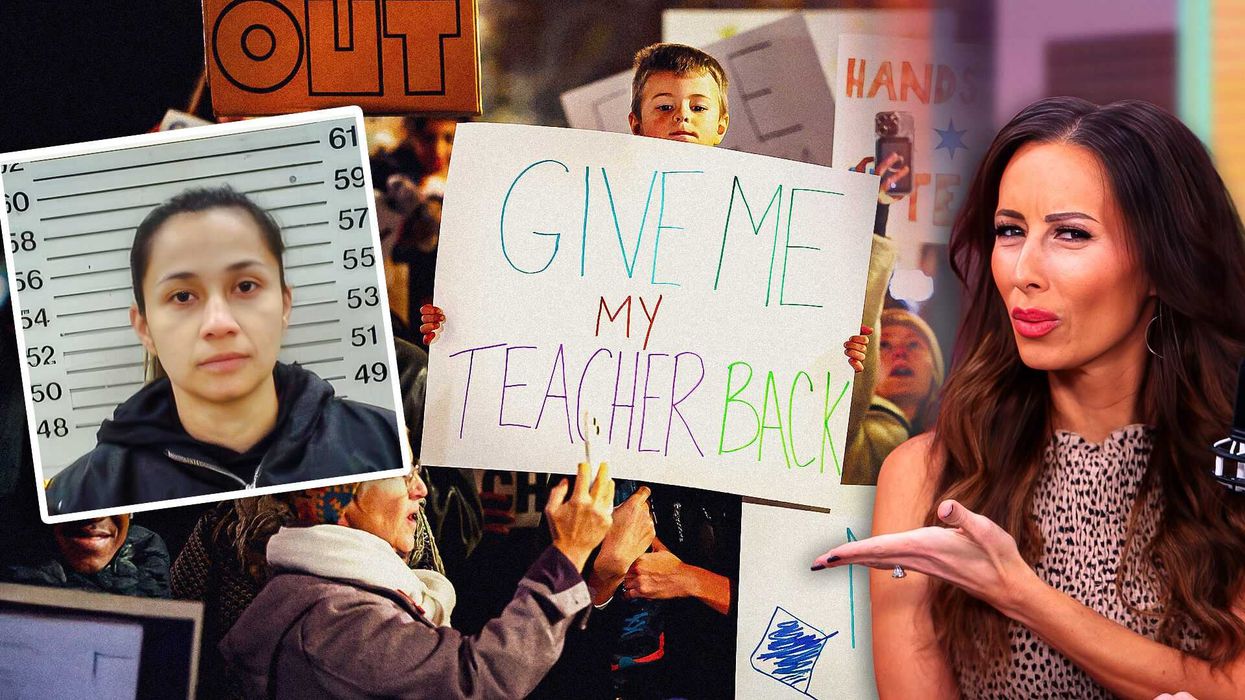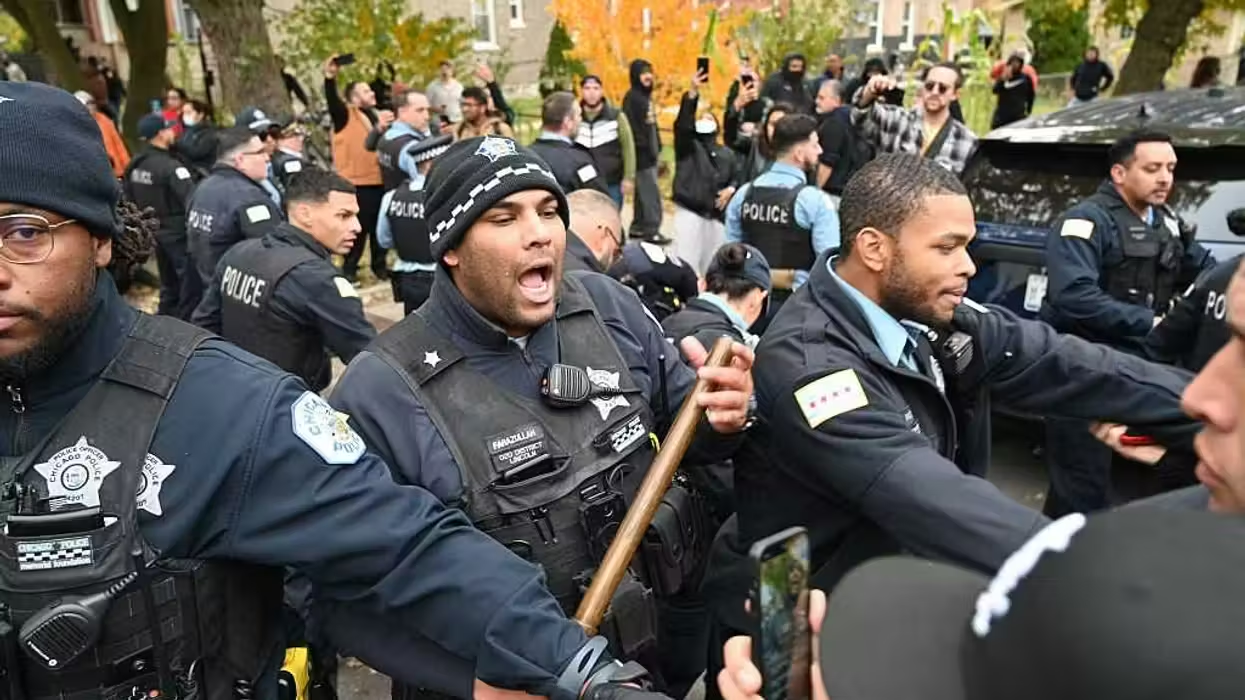
© 2025 Blaze Media LLC. All rights reserved.
So Where Are Those BP Oil Spill Payments Going? Local Gov'ts Get Millions for iPads, Concerts, & Cars
April 11, 2011
"In many cases, though, the connection between the spill and the expenditures was remote..."
NEW ORLEANS (AP) -- In the year since the Gulf oil spill, officials along the coast have gone on a spending spree with BP money, dropping tens of millions of dollars on gadgets, vehicles and gear - much of which had little to do with the cleanup, an Associated Press investigation shows.
The oil giant opened its checkbook while the crisis was still unfolding last spring and poured hundreds of millions of dollars into Gulf Coast communities with few strings attached.

In sleepy Ocean Springs, Miss., reserve police officers got Tasers. The sewer department in nearby Gulfport bought a $300,000 vacuum truck that never sucked up a drop of oil. Biloxi, Miss., bought a dozen SUVS. A parish president in Louisiana got herself a top-of-the-line iPad, her spokesman a $3,100 laptop. And a county in Florida spent $560,000 on rock concerts to promote its oil-free beaches.
In every case, communities said the new, more powerful equipment was needed to deal at least indirectly with the spill.
In many cases, though, the connection between the spill and the expenditures was remote, and lots of money wound up in cities and towns little touched by the goo that washed up on shore, the AP found in records requested from more than 150 communities and dozens of interviews.
Florida's tourism agency sent chunks of a $32 million BP grant as far away as Miami-Dade and Broward counties on the state's east coast, which never saw oil from the disaster.

Some officials also lavished campaign donors and others with lucrative contracts. A Florida county commissioner's girlfriend, for instance, opened up a public relations firm a few weeks after the spill and soon landed more than $14,000 of the tiny county's $236,000 cut of BP cash for a month's work.
The April 20 explosion on the Deepwater Horizon rig in the Gulf of Mexico killed 11 workers and spawned the nation's worst offshore oil spill. As BP spent months trying to cap the well and contain the spill, cities and towns along the coast from Louisiana to Florida worried about the toll on their economies - primarily tourism and the fishing industry - as well as the environmental impact.
All told, BP PLC says it has paid state and local governments more than $754 million as of March 31, and has reimbursed the federal government for another $694 million.

BP set few conditions on how states could use the money, stating only that it should go to mitigate the effects of the spill. The contracts require states to provide the company with at least an annual report on how the money has been used, BP spokeswoman Hejdi Feick said. But it's unclear what consequences, if any, the states could face if they didn't comply.
Some of the money BP doled out to states and municipalities hasn't been spent yet, but the AP's review accounts for more than $550 million of it. More than $400 million went toward clear needs like corralling the oil, propping up tourism and covering overtime.
Much of the remaining chunk consists of equally justifiable expenses, but it's also riddled with millions of dollars' worth of contracts and purchases with no clear connection to the spill, the AP found.
William Walker, executive director of the Mississippi Department of Marine Resources, said it's clear now that communities bought more equipment than they wound up needing. But he doesn't regret handing out BP's money freely.
"At the time we were making these decisions, there were millions of gallons of oil going into the Gulf of Mexico with no clear idea when it would stop," Walker said. "We didn't wait. We tried to get (grant money) into circulation as quickly as possible. We didn't have any extra time. We needed to move when we moved."
---
When oil from the ruptured Macondo well began to lap at Louisiana's marshes, BP deployed an army of workers to sop it up and hired contractors who specialize in disaster cleanup.
Even with BP and the federal government taking the lead, many communities weren't content to rely on equipment they had before the spill.
Lafourche (luh-FOOSH') Parish President Charlotte Randolph billed BP for an iPad, saying she needed it in addition to her parish-paid Blackberry to communicate with staff and other officials during the crisis. But she didn't buy the iPad until Aug. 26, a month and a half after the well was capped and several weeks after the federal government said much of the oil had been skimmed, burned off, dispersed or dissolved.
"Just because it wasn't streaming from the well any longer doesn't mean it wasn't approaching our shore," Randolph told the AP. "My work is very important. Perhaps one day you could follow me somewhere and learn what my work involves. I must be in contact at all times."
Lafourche Parish spokesman Brennan Matherne, who bought a new Dell laptop and accessories for $3,165, said working on the spill had worn out the computer he got just a year earlier for $2,700.
Biloxi, home to a strip of casinos overlooking the Mississippi Sound, bought 14 sport utility vehicles and pickup trucks, two boats, two dump trucks and a backhoe loader with its $1.4 million share of BP grant money.
Mayor A.J. Holloway, who drove a city-owned 2006 GMC Yukon before the spill, now has one of the vehicles the city purchased with the BP grant - a black 2011 Chevy Tahoe 1500 LT that cost more than $35,000. The city's public works director and chief engineer also are driving SUVs bought with BP money.
Holloway declined to answer questions about his new vehicle. City spokesman Vincent Creel said the mayor has used it to travel to "countless meetings" about the spill and to gauge the city's response with his own eyes.
"The mayor also uses the vehicle in the normal course of his duties, just as other BP equipment is used in the course of day-to-day business," Creel wrote in an email.
Walker, the state official, said he didn't know about the mayor's use of the vehicle but doesn't object.
Some Mississippi communities took a conservative approach in using their share of the money. Bay St. Louis received $382,461 to buy safety vests, street barricades, radios and other gear, but decided against buying a vacuum truck or other expensive equipment. City Clerk David Kolf said local officials trusted BP's word it would handle all the cleanup, so they didn't see a need to buy a "bunch of new toys."
"They had a lot of heavy equipment already staged here," he said. "We don't have the training. We don't have the personnel."
---
Florida, Louisiana, Mississippi and Alabama each got an initial $25 million from BP, followed by the array of payments for tourism marketing, seafood monitoring and cleanup programs.
More than $300,000 of BP money went to Kenny Loggins, the Doobie Brothers and Lynyrd Skynyrd for a pair of rock shows to promote the state's oil-free beaches; BP shelled out another $260,000 in concert-related costs.
In Alabama, the state Emergency Management Agency distributed $30 million to local governments without rejecting a single request.
Mississippi gave money to 14 counties and cities along the coast, which was dotted with tar balls but never saw the heavy bands of oil that choked south Louisiana's marshlands. In early August, after the well was capped and the oil threat seemed to abate, the state instructed counties and cities to stop spending BP's money without prior approval from state officials.
"We were trying to make the change from protection to restoration and recovery, and that's where we are now," Walker said.
Louisiana doled out its initial $25 million to state agencies, including $10 million for the attorney general's office to devise its legal case against BP and the companies involved in the spill. State agencies spent nearly $9 million more on equipment, including boats, air monitoring units, mobile radios and life vests.
Local government leaders in Louisiana were left to lodge their requests for money directly with BP. Gov. Bobby Jindal's top budget adviser, Paul Rainwater, said the state's deal with BP specified that the money Louisiana got wasn't meant to replace anything that was supposed to go to the parishes.
Blue-collar Plaquemines Parish, which has absorbed some of the spill's worst environmental damage, has received slightly more than $1 million in BP money, of which $998,405 went to cover oil-related overtime and other payroll expenses.
"I didn't run up bills. I treated their money like I treated our own," said Plaquemines Parish President Billy Nungesser, an outspoken critic of BP and the federal government's response to the spill. "Maybe down the road I'll look and say we should have stockpiled."
---
When BP was heavily under attack from the top down for its response to the rapidly growing environmental disaster, the company started throwing huge sums of money at the problems it had in the water and on land. Cutting checks to governments along the coast addressed both issues, even if it meant waiting until later to figure out details like how officials would have to account for the cash.
"We recognized the importance of getting funding to the states, parishes and counties quickly, and therefore provided advance funding to help kick start their emergency response," Feick, the BP spokeswoman, said in an email.
The payments to governments gave BP the kind of good PR it desperately needed, said Daniel Keeney, president of a Dallas-based public relations firm. By giving money to communities and allowing them to spend it largely as they saw fit, BP also put a buffer between itself and any questionable spending.
"Whether the funds could be perceived as being wasted or not really reflects on the organization accepting the money rather than BP," Keeney said.
Louis Skrmetta, one of the tens of thousands of business owners and individuals still waiting to get a share of a $20 billion claims fund established by BP, finds the state and local governments' spending galling, even if it's almost all BP's money.
Skrmetta runs a three-boat fleet that has a contract with the National Park Service to ferry day trippers to Ship Island, a recreation area about 10 miles offshore from Gulfport, Miss. He can't understand why BP paid so much to governments while businesses were suffering.
"I didn't think there was much logic in it," Skrmetta said. "Now, looking back in retrospect, it was a way to win over politicians, a way to win over the media."
In February, BP asked Louisiana parishes that received up to $1 million in advance payments in May for a detailed summary of how that money has been spent. Parishes were warned they must exhaust the advance money before they can make any new claims.
Some parishes, however, have banked that money and already billed BP for expenses on top of it. Terrebonne Parish says it hasn't spent any of its $1 million advance, yet BP has paid it an additional $927,842, mostly for contractors and payroll costs.
Parish President Michel Claudet said he isn't concerned that BP will try to recover unspent advance money.
"The agreement from the beginning was that it was nonrefundable," he said.
---
The oil spill drove away tourists and sapped tax revenues, but it was a boon for private contractors and consultants. Governments have spent more than $19 million of BP's money to hire contractors, according to the AP's review.
The Louisiana attorney general's office has spent $4 million and counting of BP's money to hire outside lawyers and accountants to help piece together litigation against the company. Five of the seven law firms hired and their attorneys have poured more than $80,000 total into Attorney General Buddy Caldwell's campaign coffers in recent years.
Amber Davis, who lives with Gulf County, Fla., Commissioner Bill Williams, incorporated Statecraft LLC less than a month after oil began streaming into the Gulf. Three months later, Statecraft won a monthlong, $14,468 contract to perform public information and government liaison work for the county of about 15,000 people.
Davis, who has worked in marketing and community relations, said she had planned to form her company before the spill. She also had volunteered for the county's emergency operations center for three months before she was given the contract.
"There is a perception of a conflict of interest in just about anything that anybody does," Davis said. "I guess my statement to that was that I volunteered anywhere from 15 to 18 hours a day for three months and never received a penny."
Williams said he consulted the county attorney and an ethics commission, and neither saw a problem with awarding the contract to Davis.
Gulf County awarded an identical one-month, $14,468 contract - this one for monitoring beach pollution - to Florida Eco Services, a company founded days after the rig explosion by Patrick Farrell, whose wife is on the board of the local Chamber of Commerce. Farrell says he has a background in managing and maintaining properties, as well as beach restoration.
County Attorney Jeremy Novak, who also is an attorney for Florida Eco Services, said it was a matter of giving business to locals rather than out-of-state contractors.
"It sounds like a bias, and it is, but I'm glad people in Gulf County got work and actually had the ability to feed their families," Novak said. "I don't see it as profiteering. I see it as obviously doing what you can because what you're doing for a living isn't available to you."
---
Local authorities could have taken even fuller advantage of BP's largesse had the company or state officials not nixed some requests that had no clear connection to the oil. Police in D'Iberville, Miss., for instance, were denied a $245,000 mobile command unit, a $140,000 hazardous materials vehicle and a $19,000 Harley-Davidson.
"If we had to establish barricades, they thought it would be more maneuverable," City Manager Michael Janus said of the motorcycle. "It was a bit of a reach, obviously."
Although BP footed the bill for other pricey acquisitions, some officials concede they may have to use taxpayer money to maintain them.
The Louisiana Department of Wildlife and Fisheries spent $5 million for 22 boats and the accompanying trawls, nets and hauling vehicles.
"Nobody asked me for a space shuttle or anything," said Wildlife and Fisheries Secretary Robert Barham.
BP money will cover the costs of maintaining the vessels, leasing dock space and buying fuel for at least three years, he said. Whether taxpayers will be forced to pick up these costs after that hasn't been decided.
"They don't run for free," Barham said.
---
Schneider reported from Orlando, Fla. Deslatte reported from Baton Rouge, La. AP videojournalist Jason Bronis in Gulfport, Miss., and Associated Press writers Holbrook Mohr in Jackson, Miss., Brian Skoloff in Ocean Springs, Miss., and Harry Weber and Troy Thibodeaux in New Orleans contributed to this report.
Want to leave a tip?
We answer to you. Help keep our content free of advertisers and big tech censorship by leaving a tip today.
Want to join the conversation?
Already a subscriber?
Jonathon M. Seidl is a former managing editor of Blaze News and a best-selling author and speaker. His next book, “Confessions of a Christian Alcoholic,” will be released on October 7, 2025.
Jonathon M. Seidl
Jonathon M. Seidl is a former managing editor of Blaze News and a best-selling author and speaker. His next book, “Confessions of a Christian Alcoholic,” will be released on October 7, 2025.
more stories
Sign up for the Blaze newsletter
By signing up, you agree to our Privacy Policy and Terms of Use, and agree to receive content that may sometimes include advertisements. You may opt out at any time.
Related Content
© 2025 Blaze Media LLC. All rights reserved.
Get the stories that matter most delivered directly to your inbox.
By signing up, you agree to our Privacy Policy and Terms of Use, and agree to receive content that may sometimes include advertisements. You may opt out at any time.





